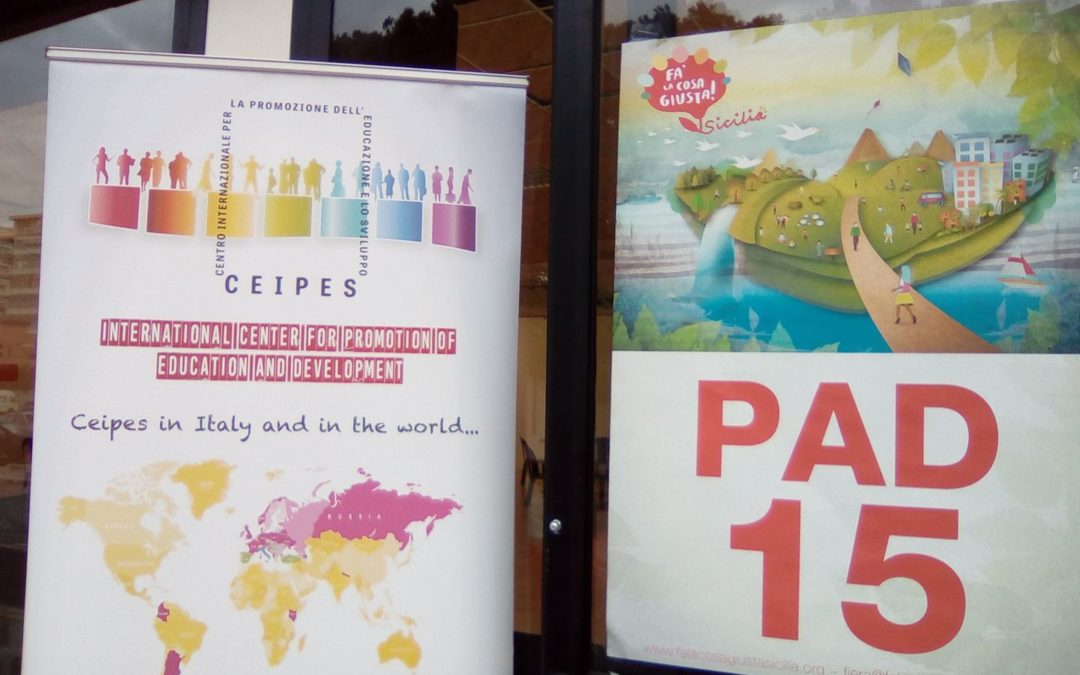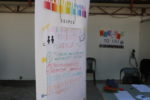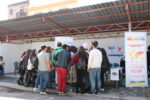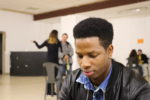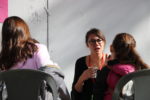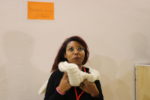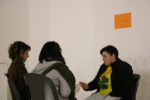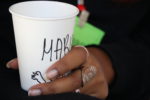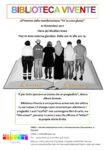“Non giudicare un libro dalla copertina”, questo il motto della Biblioteca Vivente, un’iniziativa che il CEIPES ha promosso giorno 10 Novembre 2017, all’interno della 4° Edizione della manifestazione Fà la cosa giusta Sicilia, la fiera del consumo critico e degli stili di vita sostenibili, svoltasi a Palermo, presso la Fiera del Mediterraneo.
Si tratta di un’occasione per l’incontro di diversi soggetti – cittadini, associazioni, istituzioni ed aziende- al fine di diffondere le buone pratiche di consumo e produzione sostenibili.
Entrando all’interno del padiglione 16, il visitatore ha potuto soffermarsi tra i diversi stand dedicati ai beni comuni, il cibo, l’editoria e la produzione equo-solidale, fino ad arrivare all’area-giardino, dedicata ai laboratori; questo lo spazio dedicato alla Biblioteca Vivente.
Bibliotecari, dizionari e libri viventi : tutto pronto per accogliere i giovani lettori! La prima parte della giornata è stata infatti dedicata al “Progetto Scuole”, volto ad offrire agli studenti delle scuole di Palermo dei momenti di riflessione e confronto sui temi dell’inclusione sociale e dell’interculturalità.
La prima reazione dei lettori – più o meno 150 studenti di diverse scuole medie e superiori- è stata di grande curiosità: una biblioteca umana ? Ed i libri?
Per la maggior parte di loro è stato qualcosa del tutto nuovo e la loro sorpresa si è tradotta in grande attenzione durante la “lettura” dei libri viventi: emarginazione, disabilità, migrazione, i temi proposti dai libri, dai cui racconti i piccoli lettori sono stati totalmente assorbiti, a tal punto da proporre ad alcuni di essi di ripetere l’esperienza anche presso i propri istituti scolastici.
Domande, curiosità, il feedback degli studenti è stato al di sopra delle aspettative, così come quello dei libri: la biblioteca vivente, infatti, rappresenta un momento di confronto su stereotipi e pregiudizi, che coinvolge tutti, lettori, libri e bibliotecari.
La seconda parte della giornata è stata invece aperta ad un pubblico più vasto di lettori: un pubblico molto più eterogeneo, dal semplice passante incuriosito all’operatore sociale, in cui l’impatto della biblioteca vivente è stato, anche in questo caso, più che positivo.
Sentimenti di immedesimazione, condivisione e riflessione hanno guidato i lettori alla scoperta dei diversi libri, i quali a loro volta hanno scoperto l’utilità della biblioteca: parlare di sé e della propria storia, rappresenta un momento catartico che permette di mettere a fuoco le difficoltà superate, consentendo a ciascuno di poter trasmettere forza d’animo e fiducia in sé stessi, primo passo necessario per il superamento di stereotipi e pregiudizi.
E l’impatto è stato positivo anche per i bibliotecari: durante questa manifestazione, infatti, sono stati coinvolti i nostri tirocinanti e volontari SVE, per i quali la Biblioteca Vivente era un mondo del tutto nuovo e dalla quale hanno tratto benefici positivi, soprattutto sull’importanza dell’ascolto e della condivisione.
La giornata ha dimostrato quanto sia fondamentale promuovere iniziative che consentano un contatto diretto tra le persone, perché solo attraverso il dialogo, l’ascolto attivo e la condivisione è possibile realizzare quei passi, tanto auspicati, verso l’abbattimento di pregiudizi e stereotipi in nome dell’inclusione sociale.
***ENGLISH VERSION***
“Don’t judge a book by its cover” this is the motto of the Living Library,an initiative that CEIPES promoted on 10 November 2017, within the 4th edition of the event “Fa’ la cosa giusta Sicilia”, the fair on critical consumption and sustainable lifestyles, held in Palermo, at the Fiera del Mediterraneo.
This is an opportunity for the meeting of different subjects – citizens, associations, institutions and holdings- in order to disseminate best practices on sustainable consumption and production
Entering inside ward 16, the visitor could linger among the various stands dedicated to common goods, food, publishing and fair-trade production, to the garden area dedicated to the laboratories; this was the area dedicated to the Living Library.
Librarians, dictionaries, living books: everything’s ready to welcome the young readers! The first part of the day was devoted to the “School Project”, aimed at giving students of the schools of Palermo moments of reflection and discussion on the themes of social inclusion and interculturalism.
The first reaction of the readers – more or less 150 students from different secondary schools – was of great curiosity: a human library? And the books?
For most of them it was something completely new and their surprise translated into great attention during the “reading” of the living books: marginalization, disability, migration, the themes proposed by the books, from whose tales the little readers were totally absorbed, that some of them propose to repeat the experience even in their schools.
Questions, curiosity, student feedback was above expectations, as well as the one of the books: the living library represents an opportunity for discussion on stereotypes and prejudices, involving everybody, readers, books and librarians.
The second part of the day was open to a broader audience of readers: a much more heterogeneous audience, from the simple intriguing passer to the social worker, in which the impact of the living library was, moreover, in this case positive.
Feelings of empathy, sharing and reflection led readers to the discovery of several books, which in turn discovered the usefulness of the library: talk about ourselves and our stories represents a cathartic moment that allows you to focus on the difficulties overcome, allowing each to be able to transmit fortitude and self-confidence, a necessary first step to overcome stereotypes and prejudices.
And the impact was also positive for the librarians. During this event, our trainees and SVE volunteers were involved, for whom the Living Library was a whole new world and benefited from it, especially on the importance of listening and sharing.
This event proved how essential is to promote initiatives that allow direct contact between people, because only through dialogue, active listening and sharing is possible to realize those steps, as desired, to the overthrow of prejudices and stereotypes in the name of social inclusion.
